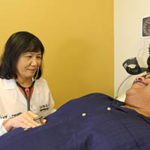 We know that the best doctors are also great communicators – people who are excellent in the science of medicine and also can engage fully with those in their care. As our nation becomes more diverse, physicians – and, frankly, all health care providers – must do more to understand their own backgrounds and those of their patients.
We know that the best doctors are also great communicators – people who are excellent in the science of medicine and also can engage fully with those in their care. As our nation becomes more diverse, physicians – and, frankly, all health care providers – must do more to understand their own backgrounds and those of their patients.
I always have hoped that the UCF College of Medicine would be a place where we celebrate our differences. A place where we share our unique backgrounds and experiences for the betterment of our community. Embracing diversity and inclusion is not only the right thing to do, but it is also the smart thing to do. Research has shown that diverse organizations and teams make better decisions – they succeed more often. By engaging with people of different backgrounds – and really learning from each other – we are all stronger.
That message was brought home once again during our recent Diversity Week events at the medical school. We and visitors from across our community and world talked about many topics. Some were easier to talk about than others. We talked about how stereotypes can get in the way of quality healthcare, and that we all have stereotypes even though we think of ourselves as unbiased. We talked about gender stereotypes and how they impact patient care and the training of physicians. We talked about language – the words we speak and the messages we send nonverbally – and how both have power in communicating with others.
We talked about our need to be culturally sensitive in caring for patients, the fact that a person’s religious beliefs, sexual orientation and cultural dining habits can impact both their health and the way we work together to improve it. We also talked about how to provide compassionate, professional care even when a patient makes biased judgements about us – when a patient’s reaction to our individual culture or language seems harsh or unfair.
 Tomorrow’s physicians will practice in a world far more diverse than the one I experienced when I was in medical school. Then, only about 10 percent of medical students were women. Today, half of all physicians in training are women, and our nation’s diversity certainly goes beyond gender. Our patients today speak many languages. They have diverse sexual orientations, religious beliefs and customs. They come to us at a critical time in their lives – when they are sick, scared and distressed. For that reason alone, we as providers or caregivers must be engaging, understanding, compassionate. We cannot be uncomfortable or hesitant in caring for people whose experiences are different from our own. We must meet their needs.
Tomorrow’s physicians will practice in a world far more diverse than the one I experienced when I was in medical school. Then, only about 10 percent of medical students were women. Today, half of all physicians in training are women, and our nation’s diversity certainly goes beyond gender. Our patients today speak many languages. They have diverse sexual orientations, religious beliefs and customs. They come to us at a critical time in their lives – when they are sick, scared and distressed. For that reason alone, we as providers or caregivers must be engaging, understanding, compassionate. We cannot be uncomfortable or hesitant in caring for people whose experiences are different from our own. We must meet their needs.
UCF’s medical school curriculum is unique nationally because it includes LCTs – longitudinal curricular themes – that run through all four years of instruction. One of these themes is Culture, Health and Society, which says that delivering high-quality healthcare requires us to have a deeper understanding of the backgrounds of our patients, their families and the environments in which they live. Our goal with this instruction is to encourage students to reflect on their own cultural values, assumptions and beliefs and identify how those values influence them as they provide care to others.
A colleague once described diversity and inclusion this way: “Diversity means you’re invited to the party. Inclusion means you get to dance.” As people committed to improving the health of all, we must be sure we are engaged and inclusive with all who seek our care.

